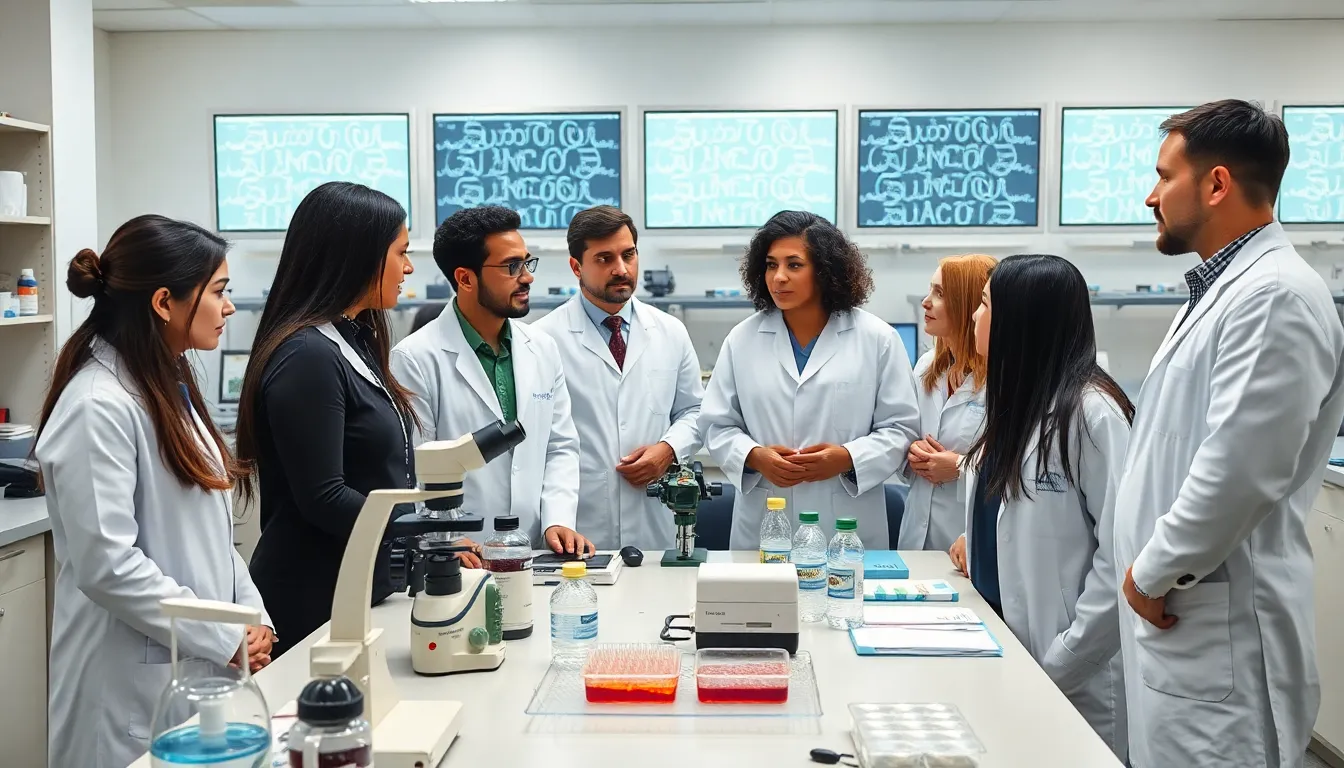Table of Contents
ToggleIn an era where science and technology rapidly evolve, biotechnology law stands at the forefront of legal challenges and innovations. This specialized field governs the intersection of biology, technology, and ethics, ensuring that advancements in genetic engineering, pharmaceuticals, and agricultural practices comply with regulatory frameworks. As society grapples with the implications of biotechnological breakthroughs, understanding the legal landscape becomes essential.
Biotechnology law not only addresses patent rights and intellectual property but also navigates complex ethical dilemmas surrounding human and environmental safety. With ongoing debates about genetically modified organisms and gene editing, legal professionals play a crucial role in shaping policies that protect public interests while fostering innovation. As the biotechnology sector continues to expand, staying informed about its legal implications is vital for scientists, businesses, and policymakers alike.
Overview of Biotechnology Law
Biotechnology law emerges as a crucial area that governs the application of biological and technological advancements. This legal framework addresses diverse aspects such as genetic engineering, pharmaceuticals, agriculture, and environmental concerns.
Key Components of Biotechnology Law
- Regulatory Framework
- Regulates the approval and oversight of biotechnological products, including genetically modified organisms (GMOs).
- Ensures compliance with safety and efficacy standards through agencies like the FDA and EPA.
- Intellectual Property Rights
- Protects inventions and innovations in biotechnological fields through patents and trademarks.
- Balances protection for inventors while promoting public access to scientific advancements.
- Ethical Considerations
- Guides ethical research practices in human and environmental contexts.
- Addresses topics such as gene editing, cloning, and bioethics.
- Policy Development
- Shapes policies that address public health, safety, and environmental impacts of biotechnology.
- Involves collaboration between legal professionals, scientists, and policymakers.
- Dispute Resolution
- Provides mechanisms for resolving conflicts related to biotechnology patents and regulations.
- Encourages mediation and arbitration as alternatives to litigation.
Global Perspectives
Biotechnology law varies significantly across jurisdictions. Countries establish distinct regulations that reflect their cultural, ethical, and scientific priorities. Understanding these differences is vital for international collaboration.
Importance of Compliance
Compliance with biotechnology law ensures not only legal protection for innovations but also fosters public trust in biotechnological advancements. Adhering to regulations safeguards human health and the environment while promoting sustainable development.
Biotechnology law plays a pivotal role in navigating the complexities of scientific progress, necessitating ongoing education and awareness among stakeholders in the field. Understanding its components helps balance innovation with societal interests.
Key Regulations in Biotechnology Law

Biotechnology law comprises various regulations that govern the field, ensuring safety, innovation, and ethical practices. This section outlines critical regulatory components in biotechnology law.
The Role of the FDA
The U.S. Food and Drug Administration (FDA) oversees the safety and efficacy of biotechnology products. The FDA reviews applications for biopharmaceuticals and genetically engineered products, assessing their benefits and risks to public health. The FDA’s regulations include:
- Drug Approval Process: It involves preclinical studies, clinical trials, and a comprehensive review before approval.
- Product Labeling: Clear labeling requirements ensure consumers are informed about biotechnology products.
- Monitoring Post-Market: The FDA monitors products after approval to address adverse effects or safety concerns.
Regulatory guidance from the FDA ensures that biotechnological advancements maintain public confidence and safety.
Patenting Biotechnological Inventions
Patenting biotechnological inventions protects innovations while fostering research and development. Patent regulations in this field include:
- Eligibility Criteria: Inventions must be novel, non-obvious, and useful to qualify for protection under patent law.
- Patent Application Process: Inventors file applications with the United States Patent and Trademark Office (USPTO), detailing their inventions’ unique aspects.
- Enforcement of Patent Rights: Patent holders can enforce their rights against infringers, promoting fair competition.
The patenting process plays a pivotal role in encouraging biotechnological innovation by providing inventors with commercial incentives.
Ethical Considerations in Biotechnology Law
Biotechnology law encompasses several ethical considerations that influence practices in genetic research and environmental impact. Compliance with legal frameworks ensures safety and integrity while promoting innovation.
Consent and Genetic Research
Consent remains a critical component in genetic research. Researchers must ensure that participants understand the implications of their involvement. Informed consent processes require clear communication about the potential risks and benefits of participation, as well as how biological samples will be used. Guidelines from organizations, such as the National Institutes of Health (NIH), emphasize the importance of transparency and respect for autonomy. Ethical safeguards protect individuals’ rights while fostering public trust in biotechnology advancements.
Environmental Impact and Liability
Environmental impact assessments play a vital role in biotechnology law. Regulations mandate thorough evaluations of potential ecological risks before approving biotechnological products. Stakeholders must consider the long-term effects of genetically modified organisms (GMOs) on biodiversity and ecosystems. Liability frameworks provide recourse for damage caused by biotechnological innovations that adversely affect the environment. Courts and regulatory bodies often examine cases related to contamination and unintended consequences, emphasizing accountability among biotechnological enterprises. Such considerations ensure responsible development and application of biotechnological advancements.
Emerging Trends in Biotechnology Law
Emerging trends in biotechnology law showcase the dynamic nature of this field amid ongoing scientific advancements and global discussions. Professionals involved must consider various international perspectives and innovative legal frameworks shaping the future of biotechnology regulation.
International Perspectives
International perspectives on biotechnology law exhibit diverse regulatory approaches among countries. The Cartagena Protocol on Biosafety, facilitated by the Convention on Biological Diversity, focuses on transboundary movements of genetically modified organisms (GMOs). In the European Union, stringent regulations emphasize precaution and comprehensive environmental assessments for biotechnological products. Countries such as India and Brazil adapt their policies to align with local agricultural practices and public health priorities, ensuring regulations reflect regional needs. Global collaboration is vital for harmonizing standards and addressing challenges posed by biotechnological advancements, particularly concerning public safety and ethical considerations.
Innovations in Legal Frameworks
Innovations in legal frameworks adapt to rapid technological progress and emerging biotechnological applications. Legislative bodies are increasingly incorporating adaptive regulations that accommodate novel findings in genomics, synthetic biology, and personalized medicine. The rise of digital health technologies necessitates updates to privacy laws, ensuring that data protection aligns with advancements in biotechnology. Additionally, the creation of specialized courts for biotech-related disputes enhances the resolution process, allowing for more informed decisions by judges familiar with scientific nuances. These innovative legal approaches aim to balance the need for regulatory efficacy with the promotion of innovation across the biotechnology sector.
Biotechnology law is essential in guiding the responsible development of scientific advancements. As innovations continue to reshape industries and societal norms, understanding the legal landscape becomes increasingly vital. Stakeholders must remain vigilant about regulatory changes and ethical considerations to ensure public trust and safety.
The dynamic nature of biotechnology law reflects the ongoing dialogue between science and policy. By fostering collaboration among scientists, legal professionals, and policymakers, the field can adapt to emerging challenges while promoting sustainable progress. Staying informed about these developments is crucial for navigating the complexities that lie ahead in biotechnology.







